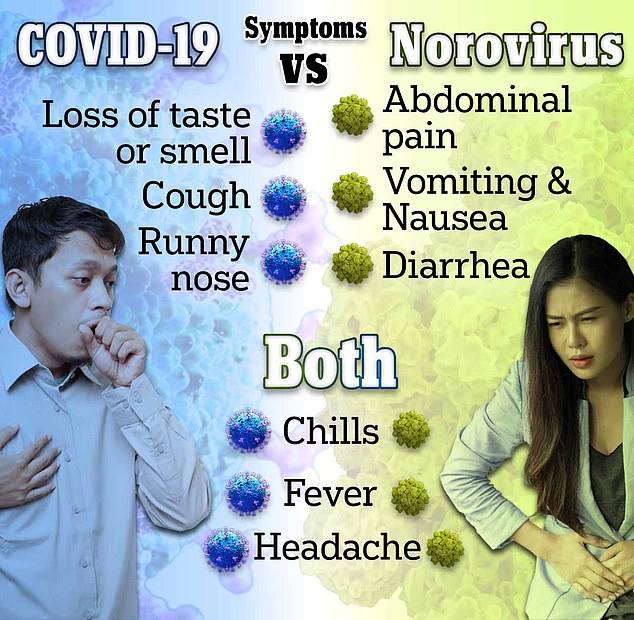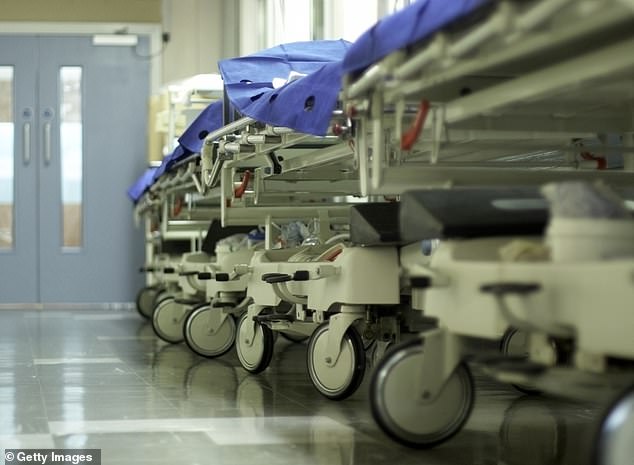The NHS is FULL! Shocking new statistics show 96% of adult beds are occupied… as norovirus surges again
The NHS is alarmingly close to capacity with 96 per cent of adult hospital beds occupied, new data revealed today.
More than 97,000 patients were in hospital in England last week – more than at any point so far this winter, officials said.
92 percent is the point at which, experts say, staff performance declines.
Meanwhile, norovirus numbers, which had been declining in recent weeks, have risen again — almost 50 percent higher than expected for this time of year.
Separate surveillance data monitoring the flu outbreak in England also suggests that hospital admissions are slightly lower than the week before, but are still four times higher than in early December.
Figures show that last week alone, almost 5,000 beds were occupied every day by flu patients, 3.5 times more than in the same week last year.
The NHS’s clinical director for urgent care warned that hospitals were ‘overcrowded’ and staff were facing their busiest week yet this winter.
Government ministers also said patients had faced ‘unacceptable’ experiences and acknowledged there was ‘much more to do’.
Several NHS hospitals have now declared ‘critical incidents’. Ambulances are pictured waiting outside the emergency department at the Royal Cornwall Hospital on January 4
Health and Social Care Secretary Wes Streeting said: ‘Despite NHS staff doing their utmost, patients’ experiences this winter have been unacceptable.
‘Annual winter pressure, which will always exist, should not automatically lead to an annual winter crisis.
‘We have ended the strikes, so for the first winter in three years, staff are on the front line and not on the picket line, and we have introduced more patients to flu vaccinations than last year, but there is still much more to do.
“It will take time to change healthcare so that patients get the standard of care they deserve, but it is possible.
‘Through our Plan for Change, this government is delivering the investment and fundamental reforms needed to ensure the NHS can once again be there for us when we need it.’
Professor Julian Redhead, NHS national clinical director for emergency care, added: ‘While it is encouraging that flu cases are no longer rising, hospitals are not out of the woods yet.
‘Staff are working extremely hard in sometimes challenging conditions, but winter virus rates are much higher than normal for this time of year.
‘This combined with the cold snap and difficulties in discharging patients means that hospitals are overcrowded with patients – even though more beds have been opened to meet the increased demand.’

Health Minister Wes Streeting said patients had faced ‘unacceptable’ experiences and acknowledged there was ‘much more to do’
According to the latest NHS weekly figures, 97,636 patients were in hospital last week, with 96 per cent of adult general and acute beds occupied.
Nearly one in seven (13,585) were admitted by patients who were medically fit for discharge.
More than a third of patients who arrived by ambulance also waited at least half an hour before being transferred to A&E – an increase from the 25.7 percent who attended at the same time last year.
About one in six patients also had delays of more than an hour, almost double the same point last year.
It comes just hours after a damning report into the state of the NHS revealed that dead patients are lying undiscovered in A&E for hours because staff are too overworked to notice.
The ‘distressing’ report, published by the Royal College of Nursing (RCN), also revealed that a severe shortage of beds has led to the sick being left in ‘animal’ conditions in hospital car parks, cupboards and toilets.
It included the testimonies of more than 5,000 nurses, who exposed how patients are cruelly ‘stripped of their dignity’ and routinely suffer preventable deaths.
The 460-page dossier said it had become ‘normalised’ for patients to be left in chairs or trolleys in ‘inappropriate environments’ for days, rather than in a ward.

Norovirus can resemble the symptoms of Covid, with both viruses causing chills, fever and headache
Demoralized nurses reported caring for as many as 40 patients in one corridor – some blocking emergency exits or parking next to vending machines.
The report comes just days after figures showed hospitals left a record 518,000 patients languishing on emergency department trolleys for 12 hours or more last year.
Separate NHS statistics also revealed today that more than 650 hospital beds in England were filled every day last week by patients with diarrhea and vomiting or norovirus-like symptoms.
The number of cases of the bug had dropped slightly in recent weeks. But it’s up again, 4 percent from the week before and 44 percent at the same point last year.
RSV – which is most common in infants and young children – was almost double in the same period in 2023.
More than 1,100 beds were also occupied by patients with Covid.
In response to rising rates of norovirus, influenza, RSV and Covid – dubbed the “quad-demic” – some hospitals had begun limiting visiting hours and imposing mask mandates.
Others had declared ‘critical incidents’ – an NHS term used by hospitals when they can no longer guarantee that patient care can be delivered safely.

A ‘distressing’ report published today by the Royal College of Nursing (RCN) revealed that a severe shortage of beds has led to the sick being left in ‘animal’ conditions in hospital car parks, cupboards and toilets. Pictured, stock photo
Such incidents are typically reported in response to overwhelming demand or failing infrastructure.
Commenting on the figures, Rory Deighton, acute director of the NHS Confederation, said: ‘It is too early to say whether virus levels have peaked in the winter, and it is likely that the health service will remain under pressure in the coming weeks to stand.
‘It is vital that we ensure that the NHS does not face more winters like the last few.
‘Improving emergency department performance requires as much focus as tackling waiting lists, and we look forward to working with the government to tackle these issues.
‘Corridor care is a last resort, but the combination of increased demand and acuity after a decade of underinvestment is leaving NHS staff with little choice and they are doing everything they can to limit the risks to patients.
‘But we cannot underestimate the impact this will have on staff who suffer the moral damage of not being able to provide the care they would like.’
